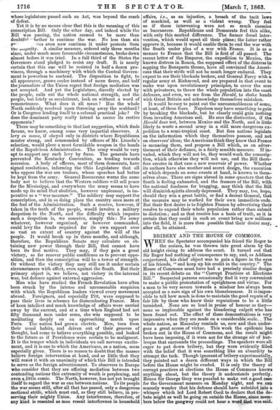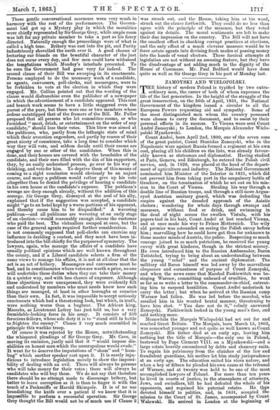BRIBERY AND THE HOUSE OF COMMONS.
WHEN the Spectator accompanied his friend Sir Roger to. the assizes, he was thrown into great alarm by the old knight rising to address the court. It turned out that Sir Roger had nothing of consequence to say, and, as Addison conjectured, his chief object was to gain a figure in the eyes of his friends, " and keep up his credit in the country." The House of Commons must have had a precisely similar desiga in its recent debate on the " Corrupt Practices at Elections- Bill." Suspected persons occasionally find it very convenient to make a public protestation of uprightness and virtue. For a man to be very severe towards a misdoer has always been accepted as a sure sign of his own blamelessness. It is impos- sible to tell how much is done to maintain the good repute of a fair life by those who know their reputations to be a little tarnished. None are so loud in praise of honour as they— none so implacable against the blundering culprit who has been found out. The effect of these demonstrations is very impressive when they are made on a considerable scale., The whole nation, as Macaulay reminds us, now and then under- goes a great access of virtue. This week the epidemic has broken out in the House of gammons, and the result might- have been imposing, if it were not for the strange air of bur- lesque that surrounds the proceedings. The speakers were all eager to put down bribery, but they were evidently filled with the belief that it was something like an absurdity to attempt the task. Though ignorant of bribery experimentally, they pointed out a dozen different ways in which the Bill before the House might be evaded. It is only the theory of corrupt practices at elections the House of Commons knows. anything about, but the theory it understands perfectly.. Hence Sir George Grey was puzzled to make out a good case for the Government measure on Monday night, and we can scarcely wonder that his defence should have subsided into a whisper, which, led Lord Robert Cecil to declare that the de- bate might as well be going on outside the House,-aince mem- bers below the gangway could not hear a woftikat was said- These gentle conversational murmurs were very much in harmony with the rest of the performances. The Govern- ment had got up a Mystery play in which the moralities were chiefly represented by Sir George Grey, while ample room was left for any private member to take a part as his fancy directed. Naturally enough the proceedings were of what is called a high tone. Bribery was cast into the pit, and Purity industriously shovelled the earth over it. A good chance of lecturing our friends on the beautiful character of the just does not occur every day, and few men could have withstood the temptations which Monday's interlude presented. To be sure the Government had gone very far indeed. The second clause of their Bill was sweeping in its enactments. Persons employed to do the necessary work of a candidate, as agents, canvassers, poll-clerks, and messengers, were to be forbidden to vote at the election in which they were engaged. Mr. Collins pointed out that the wording of the clause would disfranchise even the publisher of a newspaper in which the advertisement of a candidate appeared. This root and branch work seems to have a little staggered even the purest of the pure' but there were one or two members whose ardour outstripped that of the framers of the Bill. Mr. Puller proposed that all persons who let committee-rooms, or who furnished "meat, drink, or entertainment on the order of any candidate," should lose their votes. This blow was aimed at the publicans, who, partly from the lethargic state of mind which their avocation engenders, and partly by reason of their great nicety of conscience, take a long time to consider which way they will vote, and seldom decide until their rooms are engaged by one or other of the candidates. When this is done, and their houses are covered with the broadsides of the candidate, and their ears filled with the din of his supporters, they, by an easily understood process, go over to his way of thinking, and vote for him. To deprive them of this means of coming to a right conclusion would obviously be an unjust course, and many a publican would rather give up his vote altogether than be denied the privilege of hearing a candidate in his own house at the candidate's expense. The publican's wrongs are deep enough already, without the addition of this scourge. Sir George Grey, dismayed at the zeal of his ally, explained that if the suggestion was accepted, a candidate might "go to an hotel kept by a warm partizan of his opponent, and thereby cause him to be disqualified." A wavering publican—and all publicans are wavering at an early stage of an election—would reasonably enough choose the customer who paid the best. The victuallers escaped at once, but the case of the general agents required further consideration. It is not commonly supposed that poll-clerks can exercise any influence in deciding a contest, and they must have been in- troduced into the bill chiefly for the purposes of symmetry. The lawyers, again, who manage the affairs of a candidate have usually political opinions which arc well known throughout the county, and if a Liberal candidate selects a firm of the same views to manage his affairs, it is not at all clear that the act is an act of bribery. Messengers and canvassers must be tad, and in constituencies where votes are worth a price, no one will undertake these duties when they can take their money in a quieter way, and with less chance of exposure. Although these objections were unexpressed, they were evidently felt and understood by members who must needs know how such things are managed, at least in other boroughs or counties than their own. In fact, it was impossible to accept seriously enactments which had a threatening look, but which, in truth, were nothing worse than a bugbear. The African king, Massaba, as Lieutenant Lefroy has just told us, has a very formidable-looking force in his army. It consists of 250 ferocious fellows, whose sole duty it is to "stand still in battle to frighten the enemy." Clause 2 very much resembled in principle this warlike troop. Of course it was rejected by the House, notwithstanding the whispered pleadings of Sir George Grey. Mr. Cave, in moving its omission, justly said that it " would impose dis- abilities on honest men which the unscrupulous would evade." It went far to deserve the imputations of " sham" and " hum- bug" which another speaker cast upon it. It is surely inju- dicious to introduce legislation merely to show the impossi- bility of dealing with an evil. There will always be persons who will take money for their votes ; there will always be candidates who will buy them. We do not say that therefore there should be no attempt made to discourage bribery, but better to leave corruption as it is than to finger it with the touch of a Pecksniffe or Harold Skimpole. It is of no use brandishing the knife over a patient if we know that it is impossible to perform a successful operation. Sir George Grey thought the Bill would not be of much use if Clause 2 was struck out, and the House, taking him at his word, struck out the clause forthwith. They could do no less than agree with the principle of the measure, but they voted against its details. The moral sentiments are left to make their due impression on the country. The Bill will not have the smallest effect in checking corrupt practices at elections, and the only effect of a much cleverer measure would be to force astute agents into devising fresh modes of passing money into the hands of venal electors. These farcical attempts at legislation are not without an amusing feature, but they have the disadvantage of not adding much to the dignity of the House. of Commons. Mr. Paul Bedford would have done quite as well as Sir George Grey in his part of Monday last.



























































 Previous page
Previous page